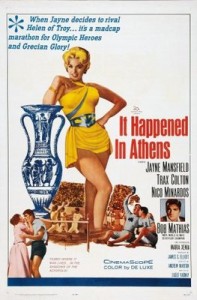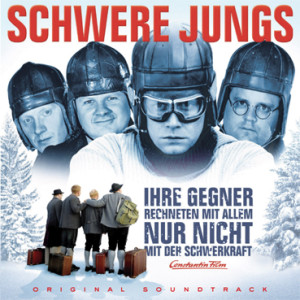So we know who holds the Olympic records for most medals won and most gold medals won – that’s an easy one, Michael Phelps, who has won 22 medals and 18 gold medals (and is probably not done yet).
But Phelps won 9 medals in relay races, winning a medal in every swim relay race in 2004, 2008, and 2012, so he had a little help. What about winning individual medals? Who has won the most individual medals and individual gold medals? Is it still Phelps?
Not quite. The most individual medals title still belongs to Larisa Latynina, the Soviet gymnast who won 18 medals in all, the records that Phelps broke in London. Latynina won 14 of those medals by herself. Here is the list of all those winning 9 or more individual medals, and women who won 8 or more:
[table]
IndMeds,Name,Gdr,Ssn,NOC,Sport
14,Larysa Latynina,F,S,URS,GYM
13,Michael Phelps,M,S,USA,SWI
12,Nikolay Andrianov,M,S,URS,GYM
10,Borys Shakhlin,M,S,URS,GYM
10,Takashi Ono,M,S,JPN,GYM
10,Aleksey Nemov,M,S,RUS,GYM
10,Ray Ewry,M,S,USA,ATH
9,Ole Einar Bjørndalen,M,W,NOR,BIA
9,Paavo Nurmi,M,S,FIN,ATH
9,Bjørn Dæhlie,M,W,NOR,CCS
9,Sawao Kato,M,S,JPN,GYM
9,Viktor Chukarin,M,S,URS,GYM
9,Vitaly Shcherbo,M,S,BLR,GYM
9,Martin Sheridan,M,S,USA,ATH
8,Věra Čáslavská,F,S,TCH,GYM
8,Claudia Pechstein,F,W,GER,SSK
8,Karin Enke-Kania,F,W,GDR,SSK
8,Gunda Niemann-St’mann-Kleemann,F,W,GER,SSK
[/table]
Larysa Latynina
As you can see, Latynina is the only woman with more than 8 individual medals, with 4 women tied at that level. Two people on this list, Ray Ewry and Martin Sheridan, won some of their medals in 1906 (Ewry 2, Sheridan 5), so purists may demur and drop them from this list.
As to individual golds, yes, Phelps does lead this list with 11. And again, Ewry presents a problem with 10, including 2 in 1906, but he would still be second with 8, if you skip the 1906 Intercalated Olympics. Here is the list of all Olympians with 5 or more individual gold medals:
[table]
IndGolds,Name,Gdr,Ssn,NOC,Sport
11,Michael Phelps,M,S,USA,SWI
10,Ray Ewry,M,S,USA,ATH
7,Věra Čáslavská,F,S,TCH,GYM
7,Carl Lewis,M,S,USA,ATH
6,Larysa Latynina,F,S,URS,GYM
6,Nikolay Andrianov,M,S,URS,GYM
6,Borys Shakhlin,M,S,URS,GYM
6,Paavo Nurmi,M,S,FIN,ATH
6,Bjørn Dæhlie,M,W,NOR,CCS
6,Lidiya Skoblikova,F,W,URS,SSK
5,Ole Einar Bjørndalen,M,W,NOR,BIA
5,Sawao Kato,M,S,JPN,GYM
5,Viktor Chukarin,M,S,URS,GYM
5,Vitaly Shcherbo,M,S,BLR/EUN,GYM
5,Martin Sheridan,M,S,USA,ATH
5,Nadia Comăneci,F,S,ROU,GYM
5,Gert Fredriksson,M,S,SWE,CAN
5,Krisztina Egerszegi,F,S,HUN,SWI
5,Clas Thunberg,M,W,FIN,SSK
5,Vitaly Shcherbo,M,S,EUN,GYM
5,Bonnie Blair,F,W,USA,SSK
5,Eric Heiden,M,W,USA,SSK
[/table]
The women’s leader is Czechoslovak gymnast Věra Čáslavská with 7 individual gold medals, followed by Latynina, and Soviet speed skater Lidiya Skoblikova, both with 6. Among Winter Olympians, Skoblikova is tied with Norwegian cross-country skiier Bjørn Dæhlie, with 6 individual gold medals, followed by 4 Winter Olympians with 5: Norwegian biathlete Ole Einar Bjørndalen, Finnish speed skater Clas Thunberg, and American speed skaters Bonnie Blair and Eric Heiden.
So who has won the most Olympic medals, without ever winning an individual medal? I dare say nobody in the twitterverse would ever get this trivia question correct, except for possibly the athlete herself, and even she may not know it. It is the Hungarian canoeist Katalin Kovács, who has won 8 Olympic medals from 2000-12, but never an individual one. Here are all those who won 6 or more Olympic medals, but never won an individual medal. As you would expect, they tend to be in sports with no, or few, opportunities to win individual medals.
[table]
Medals,Name,Gdr,Ssn,NOC,Sport
8,Katalin Kovács,F,S,HUN,CAN
7,Willis Lee,M,S,USA,SHO
7,Bogdan Musiol,M,W,GDR/GER,BOB
6,Georgeta Damian-Andrunache,F,S,ROU,ROW
6,Steven Redgrave,M,S,GBR,ROW
6,Doina Ignat,F,S,ROU,ROW
6,Veronica Cogeanu-Cochelea,F,S,ROU,ROW
6,Wolfgang Hoppe,M,W,GDR/GER,BOB
6,Eugenio Monti,M,W,ITA,BOB
[/table]
Katalin Kovács
Now who has won the most Olympic gold medals but never won an individual gold? This one some people may get, as Jenny Thompson won 12 medals and 8 golds in swimming for the United States and leads the list, and is fairly well known. Her frustration at not winning an individual gold was well publicized (as was the same for her frequent teammate, Dara Torres – of note, Thompson and Torres were, and are, not friends). In fact this is not even close, as she leads 5 athletes with 5 team gold medals, with another 21 winning only 4 team golds. Here is the list of all those with 4 or more Olympic gold medals, but no individual gold medals:
[table]
Golds,Name,Gdr,Ssn,NOC,Sport
8,Jenny Thompson,F,S,USA,SWI
5,Tom Jager,M,S,USA,SWI
5,Willis Lee,M,S,USA,SHO
5,Georgeta Damian-Andrunache,F,S,ROU,ROW
5,Steven Redgrave,M,S,GBR,ROW
5,Anastasiya Davydova,F,S,RUS,SYN
4,Dara Torres,F,S,USA,SWI
4,Ricco Groß,M,W,GER,BIA
4,Jason Lezak,M,S,USA,SWI
4,Einar Liberg,M,S,NOR,SHO
4,Lloyd Spooner,M,S,USA,SHO
4,Katrin Wagner-Augustin,F,S,GER,CAN
4,Doina Ignat,F,S,ROU,ROW
4,Aleksandr Tikhonov,M,W,URS,BIA
4,Jayna Hefford,F,W,CAN,ICH
4,Kevin Kuske,M,W,GER,BOB
4,André Lange,M,W,GER,BOB
4,Oreste Puliti,M,S,ITA,FEN
4,Hayley Wickenheiser,F,W,CAN,ICH
4,Kathrin Boron,F,S,GER,ROW
4,Teresa Edwards,F,S,USA,BAS
4,Jon Olsen,M,S,USA,SWI
4,Viorica Susanu,F,S,ROU,ROW
4,Lisa Leslie,F,S,USA,BAS
4,Caroline Ouellette,F,W,CAN,ICH
4,Matthew Pinsent,M,S,GBR,ROW
4,Anastasiya Yermakova,F,S,RUS,SYN
[/table]
So what does this all mean? Hell, we don’t know, but it was fun doing these lists!


